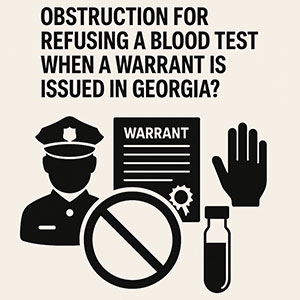Call Now For A Case Evaluation
Call Now For A Case Evaluation
 As a seasoned DUI lawyer practicing in Gwinnett County and throughout Georgia, I often get questions from clients about their rights during a DUI stop especially when it comes to blood tests and search warrants. One common concern is whether refusing to consent to a blood draw, even after police obtain a warrant, can lead to additional charges like obstruction of a law enforcement officer. The short answer? Based on recent Georgia case law, no it typically does not rise to the level of obstruction.
As a seasoned DUI lawyer practicing in Gwinnett County and throughout Georgia, I often get questions from clients about their rights during a DUI stop especially when it comes to blood tests and search warrants. One common concern is whether refusing to consent to a blood draw, even after police obtain a warrant, can lead to additional charges like obstruction of a law enforcement officer. The short answer? Based on recent Georgia case law, no it typically does not rise to the level of obstruction.
In this blog post, I’ll break down the relevant law, highlight a key trial court decision that sheds light on this issue, and explain what it means for you if you’re facing a DUI charge. Remember, every case is unique, so if you’re dealing with a DUI arrest, contact my office for personalized advice.
Under Georgia law, obstruction of a law enforcement officer is defined in O.C.G.A. § 16-10-24(a). It states that a person commits misdemeanor obstruction if they “knowingly and willfully obstruct or hinder any law enforcement officer… in the lawful discharge of his or her official duties.” This can include actions like physically resisting arrest, fleeing, or interfering with an investigation.
However, the key words here are “obstruct or hinder.” Courts have consistently held that passive non-cooperation such as refusing to consent to a search doesn’t automatically qualify as obstruction. This is particularly relevant in DUI cases, where police may seek a blood test to measure alcohol or drug levels. Even if officers secure a search warrant for your blood (which they can do after a DUI arrest if they have probable cause), your refusal to voluntarily comply doesn’t mean you’re obstructing them.
Why? Because a warrant authorizes officers to conduct the search, but it doesn’t criminalize your right to not assist. Officers can enforce the warrant if needed (e.g., by restraining you for the draw), but if they choose not to, your mere refusal to consent isn’t a crime.
A recent ruling from a State Court Judge illustrates this point perfectly. In this case:
The defendant was charged with DUI (less safe) and obstruction under O.C.G.A. § 16-10-24(a) for “failing to comply with said search warrant.” He filed a general demurrer challenging the obstruction charge, arguing it was legally insufficient.
The court agreed and dismissed the obstruction count. The State Court Judge ruled that the defendant’s “lack of consent” alone was not enough to support obstruction. The decision emphasized that this wasn’t a case of physical or verbal abuse toward officers it hinged solely on refusal to consent. The court drew parallels to Georgia Supreme Court precedents:
These cases underscore a broader principle: Refusing to provide evidence against yourself isn’t obstruction it’s exercising your constitutional rights. In the State Court case, the officers could have enforced the warrant but opted not to, making the obstruction charge even weaker. An even more obvious example would be if a criminal suspect invokes his right to remain silent, the police can not get a warrant and require the suspect to talk.
The court did uphold the DUI arrest, finding probable cause based on the officer’s observations. But the key takeaway? Refusal to consent to a blood draw under a warrant doesn’t equate to willful obstruction.
If you’re stopped for DUI in Gwinnett County or elsewhere in Georgia:
This ruling is a win for defendants’ rights, but it doesn’t mean you should handle a DUI alone. Prosecutors may still try to add charges like obstruction to pressure plea deals, so strong legal representation is crucial.
If you’ve been charged with DUI or obstruction in Georgia, don’t wait. It is to challenge weak charges early. As a dedicated Gwinnett DUI attorney with over 25 years of experience, I’ve helped countless clients beat DUI charges, suppress evidence, and protect their licenses.
Visit georgialawyer.com or call (770) 961-5511 for a free consultation. Let’s discuss your case and build a defense strategy tailored to you.
Disclaimer: This blog post is for informational purposes only and does not constitute legal advice. Laws can change, and outcomes depend on specific facts. Always consult an attorney for your situation.

George Creal is a trial lawyer who has been practicing law
in the Metro-Atlanta area for over 27 years. George brings
a broad range of experience to the courtroom. Read More